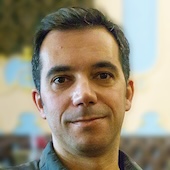I’m a Professor at the Department of Animal Biology of the Faculty of Sciences of the University of Lisbon. I am also the Curator of the Bird Collection of the MUHNAC - National Museum of Science and Natural History and Invited Curator of the Bird Collection of the MHNC-UP - Natural History and Science Museum of the University of Porto.
I am a scientist, trained as an evolutionary ecologist. Most of our work uses birds to study the importance of key traits on the evolution and long-term conservation of biodiversity. These range from coloration and trophic interactions to host-parasite systems. As Museum Curators of Avian Collections we promote the value of avian specimens for research. We mainly work with isolated, insular, fragmented, migratory and domesticated species, especially in Iberia, North Africa and Macaronesia.
